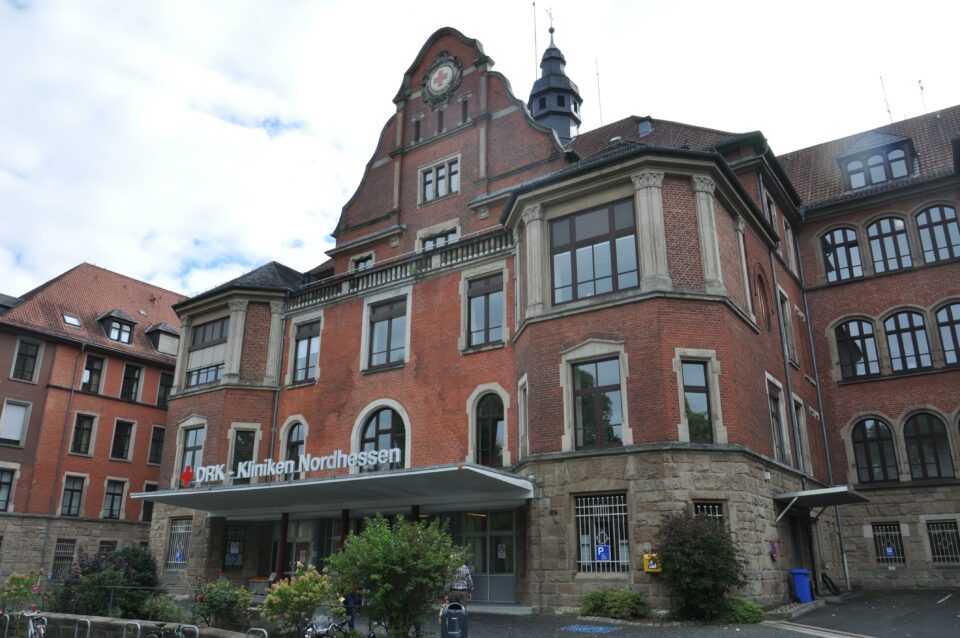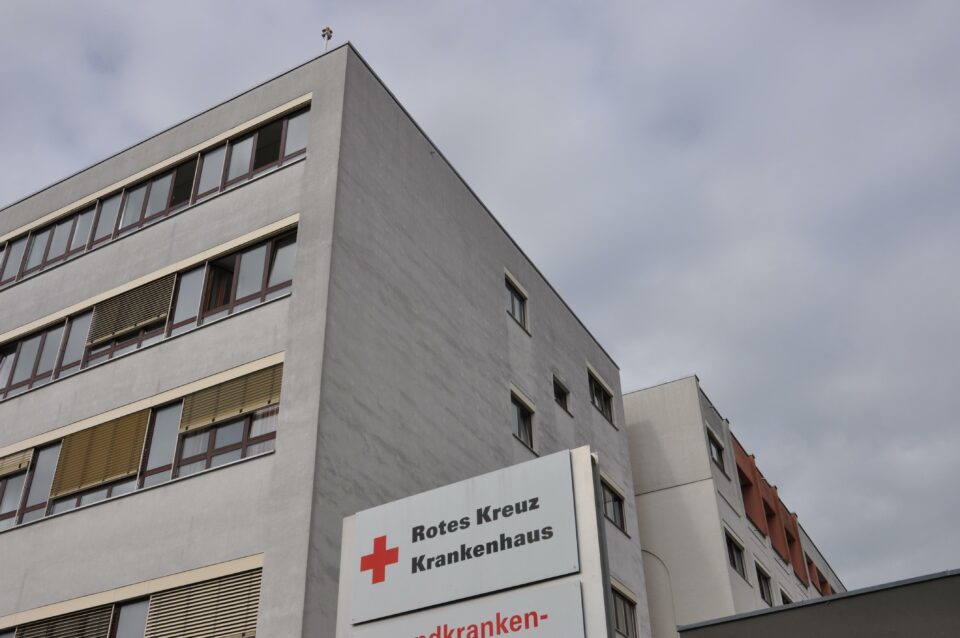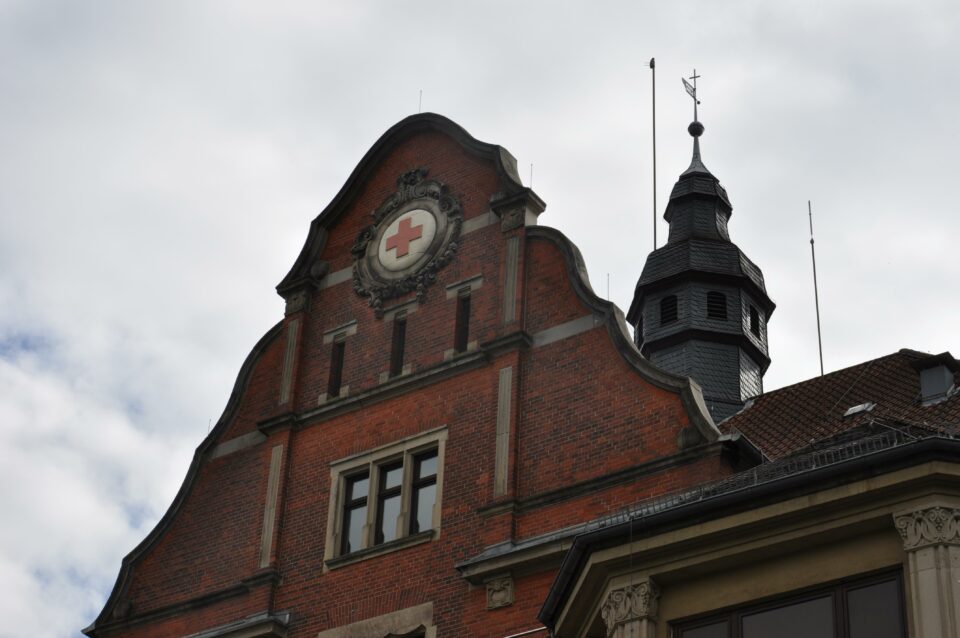That a hospital goes bankrupt in the middle of a global pandemic, sounds like a joke at first, but it is a bitter reality. In June 2021 one of the oldest hospitals in Kassel had to file for bankruptcy. At the beginning of September this year, the health group Fresenius took over the financially troubled DRK clinics, which will be continued as Helios clinics in the future. An article about missed opportunities and the impact of private sector interests in healthcare.
A guest article by Mona Jablonski and Antonia Wolf

The DRK Clinics in North Hesse have existed since 1875. They are spread across two locations in Kassel-Wehlheiden and Kaufungen and, according to their own statement, employ around 1,000 people 900 Employees. This makes them one of the largest employers in Kassel. Already 2019 The former third location in Bettenhausen had to close for financial reasons.
But the financial situation has hardly improved since then. For years, the clinics struggled to stay in the black, the management changed again and again. It seemed like that at first, as if the impending insolvency could be averted by an investor, The handles had to be removed after disagreements between the two carriers, the DRK Sisterhood and the DRK Social Services, as well as the management on 25. June 2021 File for bankruptcy.
Almost two and a half months later this happened, after the clinics had been in the hands of the welfare association for many decades, the takeover by the private player Fresenius. The healthcare group Fresenius is one of the largest hospital operators in Germany and is one of the 300 largest listed companies in the world. The Helios is part of Fresenius- Clinic Group. This holds now 89 Percent of the shares in the DRK clinics in North Hesse. The remaining 11 percent still belong to the DRK sisterhood, the co-partner remains.

What impact this takeover will have?, cannot be estimated at the present time. With regard to the statements of the alliance “Hospital instead of factoryHowever, not much good can be expected. Not only is the average workload at private hospital providers demonstrably higher, The pay is also significantly worse than with non-profit or public hospital providers. In addition, there is the so-called “cherry picking”: Private hospitals often specialize primarily in areas of health care, which are particularly lucrative and with which you can make high profits.
The main reason for this can be seen as the per-case flat rate system, the 2004 entered the German hospital landscape. This system regulates the billing of hospitals with health insurance companies. In the past, all costs incurred were covered by health insurance companies and the public sector, provided this was economically feasible, Nowadays, billing is based on flat-rate contributions. This enables hospitals, to make profits. They are trying to reduce their costs as much, that they remain under the contributions, which are included in the flat rates per case.
The implications of this are serious. On the one hand, the patients suffer- and healthcare among them. Because to reduce costs, Patients are either discharged too early, to reduce idle times. This type of undersupply is also called “bloody discharge”.. Or patients are oversupplied, by suggesting operations, for whom gentler therapies would actually be sufficient - but these gentler therapies would require more care, therefore not as profitable.
On the other hand, this also has a drastic impact on workload and conditions in the hospital. The biggest cost item in the hospital is personnel costs. At the same time, personnel costs are the most flexible from a business perspective, That means, that the savings potential is greatest here. This can then be especially the care, Cleaning- and meet service staff.

The consequences of this are also evident at the DRK clinics in North Hesse. Because of the decades-long cuts in hospital personnel, the working conditions in the nursing professions are extremely poor and the profession is therefore extremely unattractive. As in various contributions from Hessisch- Lower Saxony newspaper can be read, The DRK clinics in North Hesse fought an unprecedented battle for nursing staff and hospital staff with the Kassel Clinic, especially last year. Some tried to recruit staff with flyers in front of the other hospital, the others immediately hired an agency from Berlin, to draw attention to yourself with chalk markings.
“Privatization will further increase competitive pressure in the Kassel hospital landscape.”
Florian Dallmann, ver.di Business Secretary
All this shows, that – even if the financial distress of the DRK clinics has now been averted – the competitive pressure and the fight for personnel will remain. Florian Dallmann also agrees with this assessment, responsible union secretary of ver.di. In an interview with the press office he said, that privatization will further increase competitive pressure in the Kassel hospital landscape. This also increases the economic pressure on Nordhessen Holding's health, the operator of the clinic and a company owned by the city and district of Kassel. By taking over the Helios network, the opportunity for remunicipalization and thus fewer constraints to maximize profits in the Kassel healthcare system was missed.
However, the fight for better, needs-based healthcare is not lost. Because it's not just the Corona pandemic that has brought movement to the German hospital landscape. The health movement has also gained momentum in recent years. In the past few weeks, not only the employees of the municipal hospitals Charité and Vivantes in Berlin have gone on indefinite strike, to fight for a so-called “collective agreement for relief”.. In nearby Marburg and Gießen, civil society groups are fighting together with employees to return the privatized university hospital there to public ownership. There was also one in the clinic in Kassel last year Warning strike for better working conditions and higher wages.
For Dallmann, the privatization of the DRK clinics in North Hesse now means above all, to continue to work together with the employees to achieve a good wage level. This was also emphasized at the first demonstration by employees in the history of the DRK clinics before the summer holidays. However, he would like to see more interest from civil society in what is happening around the DRK clinics in North Hesse. After all, it's not just about the employment relationships of the employees, but also about the health care of all people living in Kassel.
